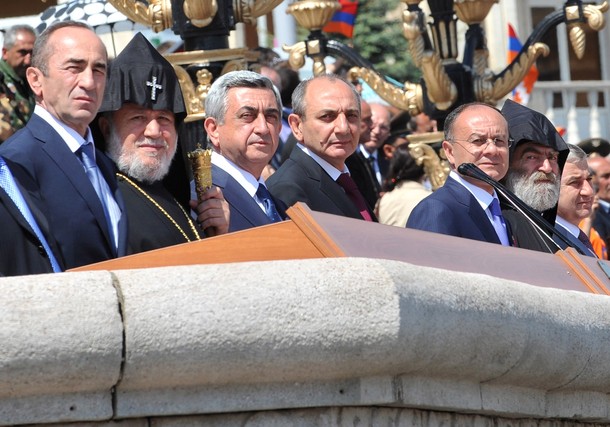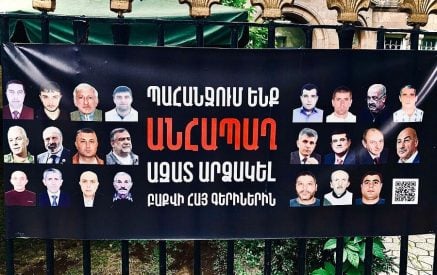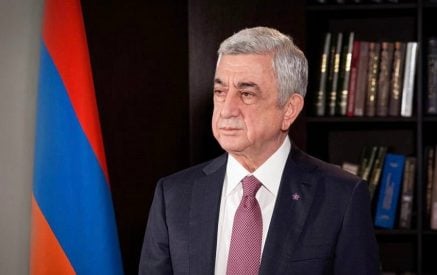According to the Chairman of “Civil Consciousness” NGO Narek Samsonyan good conditions have been created for bringing NKR back to negotiation process.
-Narek, why did the April four-day war break out? What was Aliyev’s goal? What were his reckonings? What did he achieve by doing so?
-First of all, it should be made clear that unleashing the four-day war was not conditioned only by Aliyev’s initiative. Generally, taking into account the nature of Nagorno-Karabakh conflict and correlation between mediating countries’ powers involved in the negotiation process and the ability to have an impact on the conflict, it becomes evident that Aliyev was not capable of commencing such a large-scale military actions on its own.
The four-day war should have at least been agreed with official Moscow, the proof of which we have witnessed when the counterattack planned by the Armenian armed forces was stopped as a result of a meeting of General Staff of the Armenian Armed Forces chiefs held in Moscow. The result was that Moscow simply forbad the Armenian side to implement an adequate counterattack. By the four-day war Aliyev tried to startle NKR Defence army by a blitzkrieg and breaking through the defence line to get to Stepanakert, but failed due to the high fighting efficiency of the NKR Defence Army.
Read also
-What lies ahead of Nagorno-Karabakh conflict settlement? Will the mediators be able to resume talks? Do you consider Armenia’s participation in this stage a right thing, if, of course, the negotiation process resumes?
-Aftermath the four-day war it would be quite difficult to return to negotiation table, if not impossible. I believe that OSCE Minks Group Mediators are well aware of the said. By the way, Serzh Sargsyan has openly announced that. Generally, aftermath the last aliyev-putin provocation, the Armenian side has received a carte blanche in strengthening its positions in the negotiation process. There is only a need to discuss proposed mechanisms to prevent border incidents brought forward by the OSCE Minsk Group American Co-Chair before returning to the negotiation table. Currently, there have been created quite good conditions for returning Nagorno-Karabakh to the negotiation process and the unforgivable, I’d rather say, traitorous concession that Robert Qocharyan made can be rectified by Serzh Sargsyan.
-The four-day war united our society. What do you think, can this atmosphere serve to building healthy inner atmosphere? By atmosphere I mean the relations between the authorities and the society, the establishment of confidence, in general, strengthening states positions.
-How the society unified during the April war was truly unprecedented in all respects. The Armenian society once again proved that it can subconsciously take a right stance in such situations. Of course, there were and will be such public political subjects who will do their best to fish in troubled waters, but the most important thing is that those groups do not enjoy the support of broad segments of the population. The public unprecedented mobilization is a serious challenge for the authorities. The latter must realize that post-war Armenia and the one prior to that radically differ from each other. Currently there is a good chance to rectify all the mistakes made in the past. But whether the ruling party can take this opportunity or not, will become clear in the near future.
-What issues did the four-day war reveal? What problems do you encounter in our country and what solutions do you see? What needs to be changed?
-I think the war gave answers to several important questions accumulated over the past years, which is by itself a serious challenge for Armenia. First, we have been faced with the painful reality that we do not have any ally in the world. Furthermore, the country which ostensibly has allied relations with Armenia, directly shares the responsibility of the Azerbaijani provocation. Two of the CSTO member states made anti-Armenian statements, refused to take part in the previously planned EEU sitting of Prime Ministers in Yerevan. Thus, the CSTO, the EEU, as well as the RF designated itself to be Armenia’s “strategic partner”, have proved the total failure of our foreign policy. Hence, the issue of reconsidering our country’s foreign policy is of vital importance to us. Otherwise, we are doomed to signing the next treaties of Alexandropoulos, Moscow or Kars.
-What to expect in the Armenia’s political life? On the one hand, political environment in Armenia can be considered quite predictable to some extent. But is it allowable to rule out unexpected changes?
-Perhaps, all the processes happening in the political field are rather predictable. As I have repeatedly noted, political life of our country is in single foreign political domain. Most of the oppositional forces are unable to carry out any effective political process and Armenian citizens have been long ago disappointed in the authorities, but in the absence of a proper alternative, the vast majority of citizens cooperate with the authorities. In fact, there is no opportunity for the political status quo to be changed, since no political process serves interests of a RA citizen. If we pay attention to the fact of unification of the first and current Presidents of Armenia in the framework of pro-Russian context, it should be noted that Serzh Sargsyan would be able to avoid force majeure situations through “political analysis”. Therefore, apart from the fact that the outlook of sudden changes under current circumstances cannot contribute to strengthening of Armenia’s statehood, it is also practically impossible in the near future.
-I would like you to touch upon the role of youth as well as the generation change in politics. Particularly, what goals did your organization set?
-Generation change in politics, first and foremost means change of ideological approaches, political mechanisms, as well as toolkits used for operating in the field. Generation change cannot be considered the act of repeating previously failed political practice, even if it is put into practice by much younger representatives of the same failed political force. Currently, there have been created quite objective conditions for political generation change in our country. For that several subjective and rather challenging obstacles should be overcome. The latter can work only if there are established political/civic units relatively independent from the current political system. There should be chosen a complex path which will lead to real changes.
This is the thing we are trying to conduct. Likewise in recent years, our organization has its own agenda and carries out activities relevant to it, in contrast to other organizations working in the field. Inner and foreign political processes are being analyzed and proper solutions are being brought forward. The official web-site of our organization is running, where mainly professional analyses are published. “Free Students’ Forum”, which is our organization’s student union, is actively involved in educational affairs by vigorously working within educational institutions. By the end of the year the professional manual on “The Applicability of Nonviolent Struggle in Armenia” I’ve been working on will be available in two languages. Generally, the attempts to achieve rapid success practiced by the forces working in the field is unacceptable for us and we have chosen the principle of “hurrying slowly” due to which today we have self-financing and stable institution, which regardless of the internal political conjuncture will implement all of its objectives.
EMMA GABRIELYAN






















































